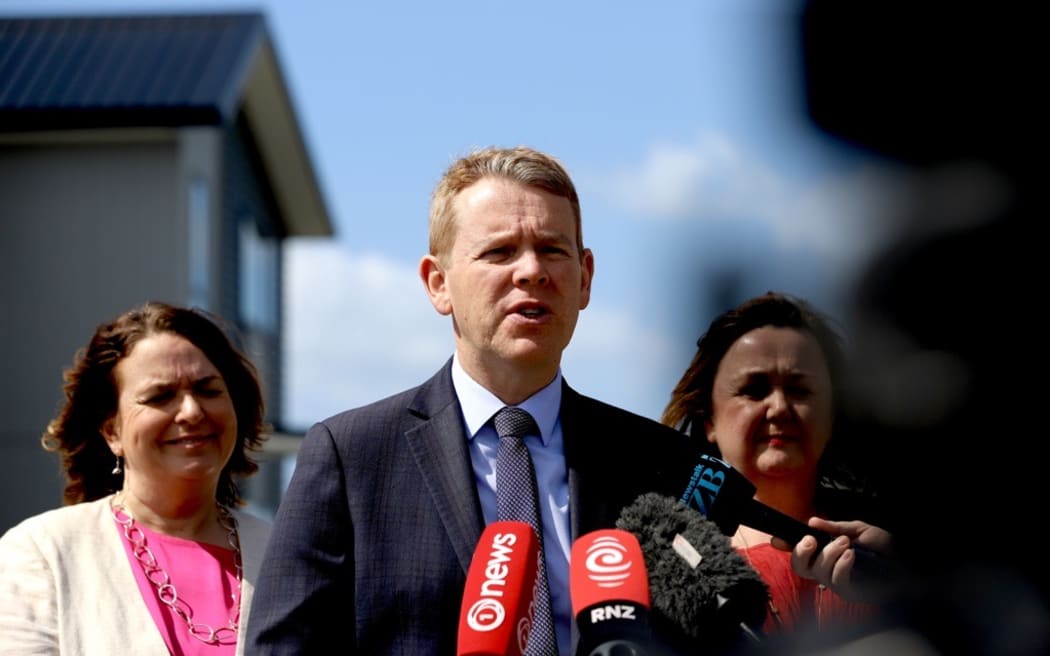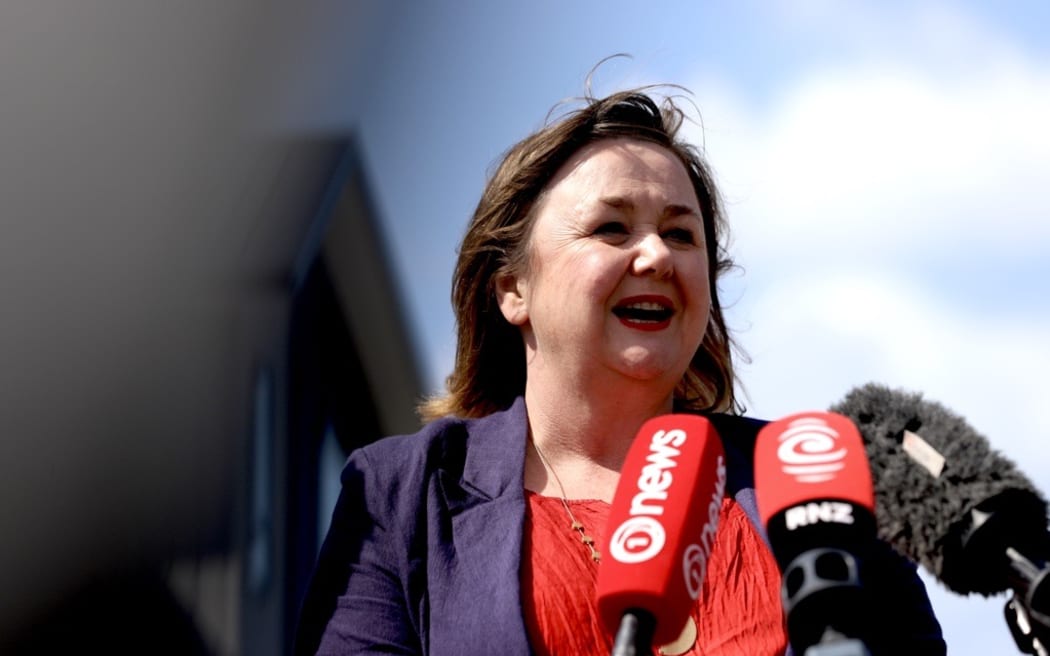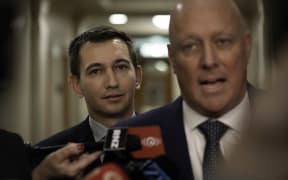
Labour leader Chris Hipkins speaks to media after announcing the party's solar panels and battery rebate policy. Photo: RNZ / Marika Khabazi
Labour is promising rebates of up to $4000 on rooftop solar panels and battery installations, and an extra $20 million for community energy projects.
It expects to also fit another 1000 Kāinga Ora homes with solar panels each year.
This comes on top of the decarbonising rebate policy announced in the past fortnight.
The party launched its solar policy on Monday, saying it would help increase renewable generation and reduce reliance on the national grid.
It would give up to $2000 for installation of rooftop solar panels on a home, plus up to $2000 for installing a battery.
Separately, the party would put $20m of new funding into a community energy projects fund, aiming to put more renewable energy into the grid and help lower power bills nationwide.
Read more of RNZ's full election coverage:
- Caucus podcast
- Poll of polls and donations data
- Guide to party policies
- What you need to know about post-election negotiations
Labour leader Chris Hipkins said the policy would aim to double rooftop solar generation in New Zealand, though his initial statement gave no deadline for this.
"There are well over 40,000 New Zealand homes getting cheaper, clean electricity with rooftop solar - this will more than double that with approximately 60,000 more rooftop solar systems," he said.
"We spoke to a family this morning who have seen their bill drop from $800 a month to $25 a month. I think every family watching this will see that's a game-changer."
He said New Zealand needed to increase renewable generation by 68 percent by 2050, and this policy would help.
"Experience from projects funded through our Community Renewable Energy Fund shows household solar panels can reduce energy bills by up to 50 percent. That's a saving of up to $850 a year."
Labour's Energy spokesperson Megan Woods said the policy would have "a relatively high income threshold".
"It's assistance and this is the kinds of ways government around the world are assisting people, not paying for the whole thing."

Megan Woods Photo: RNZ / Marika Khabazi
The extra funding for community energy would go towards things like mini urban solar farms, which "provide revenue to those with spare commercial roof space by installing solar panels which feedback into the grid", she said.
"By transitioning the bulk of our energy generation to renewable sources, like wind, solar and hydro in a fiscally responsible way, we can better protect New Zealanders from international pressures on energy prices like we have seen over the last two years with the war in Ukraine.
"We can either remain vulnerable to volatile global economic forces or follow Labour's affordable plan that boosts energy production, reduces emissions, lowers energy bills, and positions New Zealand with a future proof economy."
She said the extra generation from the rooftop solar would amount to "a little bit more than a windfarm's worth of generation".
The country needed to be building about four wind farms per year worth of generation to make up the renewables shortfall, so the policy announced today is "important, but it's not going to be the only thing. Things like offshore wind obviously much greater capacity, but this is an important part of the mix".
The incentives to install a battery was a "huge part" of the scheme.
"Wind and solar are going to be a huge part of our energy future ... that's exactly why we have a project under way to look at how we store energy in a renewable form. That is critical - intermittents are part of our future and anyone who wants to govern this country has to be thinking about what stability and security looks like within that system. And that's what we're doing."
Labour's earlier decarbonising rebate policy promised up to $18,000 in rebates for "deep retrofits" to homes - upgrading a whole house all at once by installing double glazing, insulation, airtightness upgrades and replacing gas heating and hot water - or up to $7000 for partial retrofits, and up to $3000 for replacing gas connections with electric.
'Saying it's so doesn't make it so' - National
National's leader Christopher Luxon on Monday said he had not yet seen the detail of the policy but National's approach would be to speed up consenting of solar farms.
"We have large electricity companies that actually want to make those renewable investments and will do over the coming years, because there are good economics for them to do so. But we need to play our role in government, which is actually around speeding up consenting times, setting up EV charging networks, for example, across the country."
He said he had not "thought too deeply" about domestic solar generation.
"Solar plays a part in terms of solar farms, wind farms, geothermal, we have rich and abundant renewable energy in this country but we now need to commercialise that."
Asked if National would put solar panels on social housing, he says the "priority is actually to get houses built, that's job number one".
He said he had visited "one of the biggest [solar farms] in New Zealand" which took eight years to consent and only two to build - and Labour had six years to get anything done, "and they've done nothing".
"That's the major thing with this government, it's all talk, no action, all spin, no delivery - saying it's so doesn't make it so."
Greens would go further - Genter
In a statement, the Green Party said the policy was a step in the right direction but did not go far enough.
The party's energy spokesperson, Julie Anne Genter, said the Greens' Clean Power Payment policy would cover the full cost of solar panel installation, alongside other clean energy upgrades.
"We're pleased that Labour is, again, picking up our ideas but they need to go further," she said.
"Whereas Labour's plan would help people with around 20 percent of the upfront cost of solar, the Green Party will help people cover the entire cost - through a mix of grants and interest-free loans that together could unlock solar for every household."
She said Labour's promise of 1000 rooftop solar installations on Kāinga Ora homes each year compared to 30,000 over three years under the Greens.
"We estimate that the Green Party's Clean Power Payment will lead to a third of all homes having solar over the next 15 years.
"Together with measures to save energy, harnessing the power of the sun is the single cheapest way to slash emissions and save people money on their power bills.
"The only obstacle in front of us is political."
Hipkins said Labour's solar package was "quite different" to the Greens' proposal, and not merely a watered down version.
"It includes the work that we're doing around retrofits.
"Of course we share a vision in common with the Green Party around a fully renewable future for New Zealand."
Greenpeace backs policy
In a statement, Greenpeace said it supported the policy, having campaigned for years for politicians to commit to solarising New Zealand, and called for further action.
"We are pleased to see Labour come through with a commitment to boost household and community energy. It's common sense and something that many New Zealanders want," Greenpeace Aotearoa spokesperson Amanda Larsson said.
"After introducing the globally significant ban on new offshore oil and gas exploration, this Labour Government has done very little to address climate pollution, so it's good to see Labour commit to a new policy like this. But we need to see much more.
"To date, New Zealand has really lagged behind our peers when it comes to helping households make their own clean power from the sun."
She said overseas examples showed local ownership was essential to generate buy-in for renewable energy and ensure benefits for local people and communities, which would in turn accelerate uptake.
She said any party that was serious about climate change also needed ambitious policies to regulate dairy, and divert road spending towards rail, public transport and cycling.







